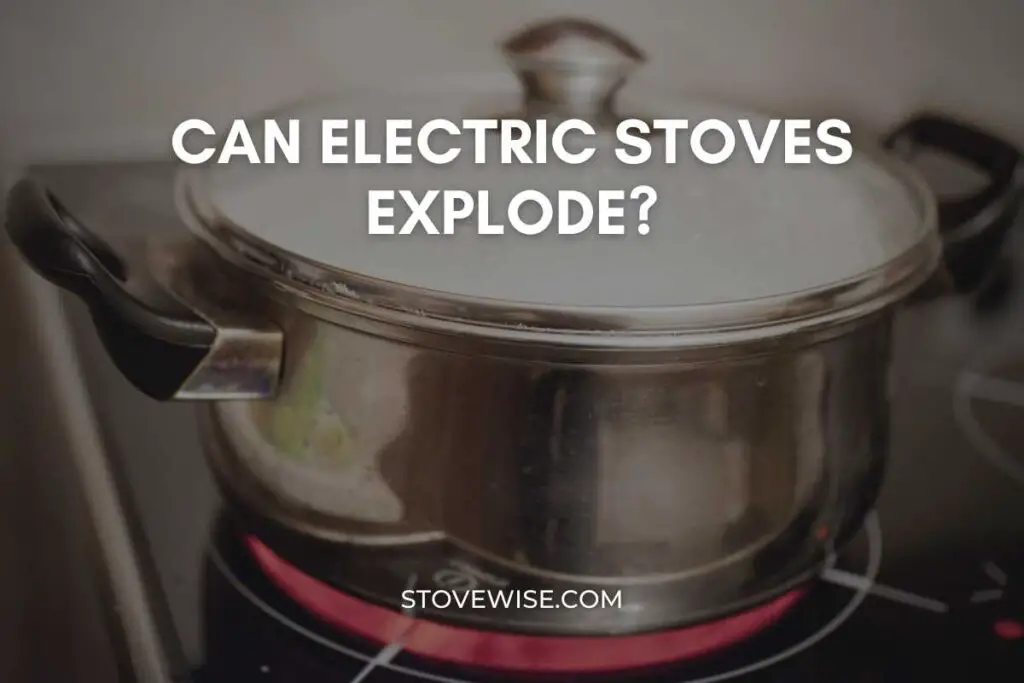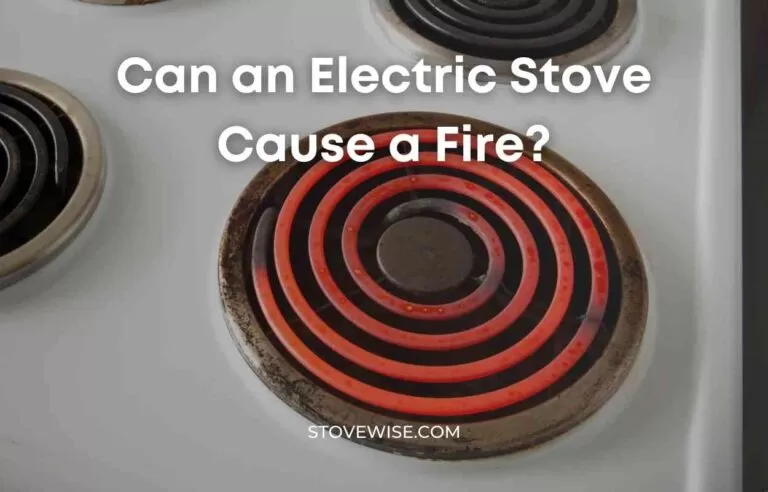Can Electric Stoves Explode? Uncovering the Truth
Exploding electric stoves may seem like a far-fetched scenario, but safety concerns are still valid.
Can electric stoves explode?
Electric stoves have the potential to explode under certain circumstances. Instances where the coil range element becomes loose, cracked, or damaged, resulting in sparking and electrical fires, can lead to an explosion. Furthermore, a damaged power cord with overheating potential, caused by prolonged stove usage or worn insulation that leads to wire short circuits, can also pose a risk of explosion.
It is essential to maintain and promptly address any defects or malfunctions to ensure the safe operation of electric stoves.
In this guide, we delve into the potential risks associated with electric stoves and explore the factors that may lead to a catastrophic event. Get ready to uncover the truth behind the question:

Contents
Causes of Electric Stove Explosions
Faulty Wiring
If an electric stove is incorrectly wired during installation, it can lead to short circuits, fires, or even explosions.
Over time, electrical wires can become worn or damaged, increasing the risk of malfunctions.
Damaged Components
A damaged or worn-out heating element can overheat, potentially causing a fire or explosion.
Faulty or damaged internal components may lead to electrical issues and subsequent explosions.
Improper Use
Placing excessive weight on the stove or using oversized cookware can strain the appliance, leading to potential accidents.
Leaving the stove unattended while cooking increases the risk of fires, which can result in explosions.
Lack of Maintenance
Regular inspection and maintenance of an electric stove can help identify and address potential issues early.
Accumulation of grease or debris on the stove may lead to fires, increasing the risk of an explosion.
External Factors
Sudden voltage spikes in the electrical system can cause damage to the stove, potentially leading to a catastrophic event.
If the stove comes into contact with water or excessive moisture, it can cause short circuits and potentially explode.
How Common Is It for a Stove to Explode?
The occurrence of stove explosions is relatively rare, particularly for electric stoves, which are generally considered to be safer than their gas counterparts.
This is because electric stoves do not rely on combustible fuels, and therefore, the risk of gas leaks and subsequent explosions is eliminated. However, this does not mean that electric stoves are entirely risk-free.
As I mentioned earlier, factors such as faulty wiring, damaged components, improper use, lack of maintenance, and external factors can contribute to the risk of an electric stove explosion.
It is essential for users to follow safety guidelines, conduct regular maintenance, and promptly address any issues to minimize the chances of a stove-related accident.
While the probability of an electric stove explosion is low, it remains crucial to be aware of the potential hazards and take necessary precautions.
Types of Electric Stove Tops and Their Operation
There are several types of electric stove tops available, each with its own method of operation. Here, we will discuss the most common types:
Coil Stove Tops
These stovetops feature exposed metal coils that heat up when electricity flows through them. The coils transfer heat directly to the cookware placed on top. They are generally the most affordable option and are easy to replace if damaged.
Ceramic Glass Stove Tops
These stoves have smooth, flat surfaces made from a ceramic glass material. Underneath the surface are heating elements that warm up and transfer heat to the cookware. Ceramic glass stove tops are easy to clean and maintain, and their sleek design is visually appealing.
Induction Stove Tops
Induction cooktops use electromagnetic fields to generate heat directly within the cookware, rather than heating the cooktop surface. This makes them more energy-efficient and safer, as the stove top remains relatively cool to the touch. Induction cooktops require compatible cookware, typically made from ferrous materials like cast iron or magnetic stainless steel.
Infrared Stove Tops
Infrared stoves utilize halogen lamps or infrared heating elements to generate heat. These elements emit infrared radiation, which is absorbed directly by the cookware. Infrared cooktops provide rapid heating and precise temperature control, making them ideal for certain cooking techniques.
How Long Does It Take an Electric Stove to Catch Fire?
The time it takes for an electric stove to catch fire depends on several factors, such as the condition of the stove, the nature of the issue leading to the fire, and external factors like the presence of flammable materials nearby.
In general, electric stoves are considered safer than gas stoves, and the risk of a fire is relatively low if the stove is properly maintained and used according to safety guidelines.
Faulty wiring or damaged components can cause electrical issues that may lead to a fire. In such cases, a fire can start quickly or take some time to develop, depending on the severity of the issue.
For instance, a short circuit caused by damaged wiring can result in a fire almost immediately, while a slowly overheating component may take longer to reach a critical temperature that causes a fire.
Additionally, external factors like flammable materials near the stove can also impact the time it takes for a fire to start.
For example, if a cloth or paper towel is left too close to a heating element, it can ignite within minutes. On the other hand, a well-maintained stove in a clean, clutter-free area is less likely to catch fire.
It is crucial to follow safety guidelines and practice proper maintenance to minimize the risk of a fire involving an electric stove.
Regularly inspect the stove for signs of wear or damage, keep flammable materials away from the stove, and never leave cooking unattended to ensure safety in the kitchen.
Actions to Take When Your Electric Stove Catches Fire
If your electric stove catches fire, it is crucial to act quickly and calmly to ensure your safety and minimize damage. Follow these steps in case of a fire:
Turn off the stove: Immediately switch off the power to the stove, either by turning off the control knobs or cutting off the electricity at the circuit breaker or fuse box.
Do not use water: Never attempt to extinguish an electrical fire with water, as it can cause electrocution or worsen the fire. Water conducts electricity, and using it on an electrical fire may create a shock hazard.
Use a Fire Extinguisher:
If you have a fire extinguisher rated for electrical fires (Class C in the US, or Class E in other countries), use it to put out the fire. Make sure you are familiar with how to operate the extinguisher and follow the PASS method (Pull the pin, Aim at the base of the fire, Squeeze the handle, and Sweep side-to-side).
Smother the fire: If the fire is small and contained, you can try to smother it using a non-flammable object like a pot lid or baking sheet. Do not attempt this if the fire is spreading or if it puts you at risk.
Evacuate and Call for Help:
If the fire cannot be extinguished quickly or continues to grow, evacuate the area immediately. Close doors behind you to help contain the fire and call your local emergency number (911 in the US) for help. Do not re-enter the building until it has been declared safe by professionals.
Prevent Future Fires:
After the situation has been resolved, assess the cause of the fire and take necessary precautions to prevent it from happening again. This may include repairing or replacing the stove, regularly inspecting the appliance, and following safety guidelines while cooking.
How to Prevent An Electric Stove Explosion?
Preventing an electric stove explosion involves taking several precautions and following safety guidelines. Here are some measures you can take to minimize the risk of an explosion:
1. Proper Installation
Ensure that your electric stove is installed by a qualified technician, following the manufacturer’s guidelines and adhering to local electrical codes. Proper installation minimizes the risk of faulty wiring or other electrical issues.
2. Regular Inspection
Periodically inspect your electric stove for signs of wear or damage, such as frayed wires, damaged coils, or cracked surfaces. Address any issues promptly to prevent potential hazards.
3. Use the Right Cookware
Always use cookware that is suitable for your stove type and size. Overloading the stove or using oversized cookware can strain the appliance and increase the risk of an accident.
4. Keep the Stove Clean
Clean your stove regularly to prevent the buildup of grease or debris that could ignite and cause a fire. Be sure to clean both the surface and the area underneath the burners.
5. Avoid Flammable Materials
Keep flammable materials, such as cloth, paper towels, or cooking oil, away from the stove while it is in use. This reduces the risk of these materials igniting and causing a fire or explosion.
6. Don’t Leave Cooking Unattended
Always stay in the kitchen while using the stove, and monitor the cooking process closely. Unattended cooking is a leading cause of kitchen fires.
7. Use the Stove Only for Cooking
Avoid using your electric stove for purposes other than cooking, such as heating your home. Using the stove improperly can lead to overheating and increase the risk of an accident.
8. Maintain Proper Ventilation
Ensure that your kitchen is well-ventilated to dissipate heat and prevent the buildup of potentially combustible gases or fumes.
9. Install a Smoke Alarm
Install a smoke alarm in your kitchen or nearby area, and regularly check its functionality. A working smoke alarm can alert you to a fire early, allowing you to take action before it escalates.
10. Be Prepared for Emergencies
Familiarize yourself with the proper use of a fire extinguisher rated for electrical fires and have one easily accessible in the kitchen. Develop an emergency plan and ensure all household members know what to do in case of a fire.
Final Thoughts
In conclusion, while electric stoves are generally considered safer than their gas counterparts, they can still explode under rare circumstances.
Factors such as faulty wiring, damaged components, improper use, and lack of maintenance can contribute to the risk of an electric stove explosion.
To minimize the likelihood of such an event, it is essential to follow safety guidelines, conduct regular inspections, and address any issues promptly.
If you are aware of the potential hazards and take the necessary precautions, you can enjoy the benefits of electric stoves while ensuring a safe and secure cooking environment.






